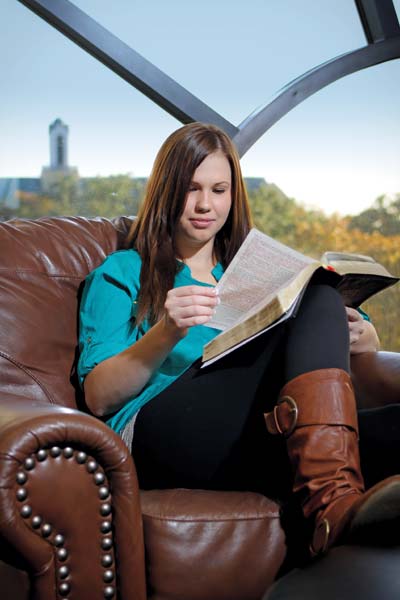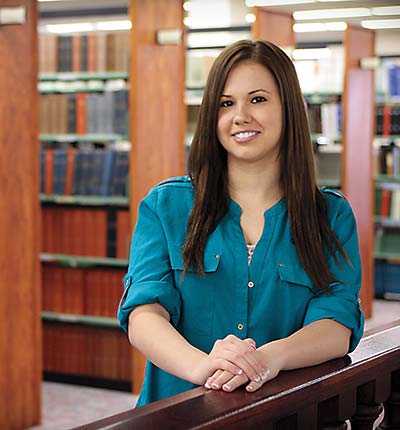
Tabatha Azua, a non-Adventist student fresh out of the U.S. Marines, had no interest in God when she reluctantly signed up for a religion class at Southwestern Adventist University.
But Tabatha said she caught a glimpse of God in the classroom during that first semester in Keene, Texas. So she promised God that she would take more religion classes to learn more about Him. When she told a fellow classmate, an Adventist, about her vow, she was shattered to receive a sharp rebuke.
“I was immediately criticized about my decision and was told, ‘That’s not the right way to learn about God,’ ” Tabatha said. “I was hurt and told God to forget my decision to learn more, and that if His people were this way, I didn’t want to be a part of this religion.”

Tabatha’s broken promise bothered her. She worried that she might have blasphemed God and been rejected by Him forever. A week later the tough former marine approached a professor in the Religion Department and, with uncharacteristic tears filling her eyes, told him the story.
The professor expressed sadness about the criticism and explained that Tabatha’s sorrow indicated that she probably had not committed an unpardonable sin. He said that the devil sometimes puts things in people’s paths to discourage them, and that Tabatha’s experience provided proof that she was on the right track.
“This motivated me to pursue God more, and only God,” Tabatha said. “I didn’t need anyone’s approval but God’s.”
With newfound determination Tabatha embarked on a search for God’s will in her life that resulted in her baptism last October. Twelve people who heard her story at the baptism asked to be baptized as well.
Adventist universities may be viewed as a training ground for Adventist young people, but they also play a key and sometimes-overlooked role in introducing non-Adventists to God.
No one keeps a tally of how many non-Adventist students studying at the church’s 113 universities and colleges worldwide are baptized every year, said David Trim, director of the Adventist Church’s Office of Archives, Statistics, and Research. But the latest figures* from his office indicate that non-Adventists comprise 39 percent of the 27,000 students enrolled in the 14 schools in North America and 45 percent of the 136,700 students at schools worldwide.
Lisa Beardsley-Hardy, the Adventist Church’s top education official, said Adventist education seeks to restore the image of God in all students, a redemptive purpose that encompasses Adventist and non-Adventist students alike.
“I’m not concerned that there would be students of other faiths or no faith at our schools. But I am concerned if we have teachers of no faith, because they can’t achieve this redemptive purpose,” said Beardsley-Hardy, director of the General Conference’s Education Department. “The single most important thing that we need in our schools is committed, converted Seventh-day Adventist teachers.”
Church cofounder Ellen G. White likened education to redemption in her 1903 book
Education, writing, “In the highest sense the work of education and the work of redemption are one” (p. 30).
Tabatha, described by professors as an outgoing student with a contagious smile and a gentle demeanor, credits teachers with leading her to God.
Tabatha, raised as a nondenominational Christian in Baltimore, Maryland, signed a contract to join the U.S. Marine Corps on her seventeenth birthday. She later married a fellow soldier, and, after giving birth to a boy, resolved at the age of 21 to return to civilian life to be more available to her son. Moving to her husband’s hometown of Cleburne, Texas, she decided to take advantage of the free tuition offered to former military personnel and attend a university.
“I got on the Internet and googled ‘universities in Cleburne,’ ” Tabatha said. “The first school on the list was Southwestern Adventist University, which was perfect, because it was a university that offered nursing, and it was five minutes away from my husband’s house.”
Her husband, Sammy, had never heard of the university, and neither he nor Tabatha knew anything about Adventists. But she named Southwestern as her school of choice on her ACT university entrance exam.
The exam did not go well, Tabatha said, and she feared that she would not get the score of 18 needed to enter Southwestern. About the same time her marriage hit the rocks, and she filed for divorce, planning to move back to Maryland.
Then the ACT results arrived. She got 18.
“I thought,
Wow, there is no way,” Tabatha said. “I went to Southwestern Adventist University that week to register.”
Tabatha immediately felt at ease at the university, one of the smaller Adventist schools in the U.S., with 676 Adventist students in a student body of 766. But she planned to stay only one semester before transferring to a university in Maryland.
Tabatha had to enroll full-time to qualify for free tuition. So she worriedly went to the university’s Web site to find an alternative class when she got wait-listed for her first choice.
“I told myself not to take a religion class, because it would be a waste and wouldn’t transfer,” she said. “But Life and Teachings of Jesus was the only class left that fit my schedule, so I signed up for it.”
On the first day of class she announced to the professor that she knew nothing about Jesus but didn’t want to fail his class. He smiled and said, “This is a great place to learn.”
“I fell in love with Jesus and really enjoyed that class,” Tabatha said. “I also decided to stay at Southwestern.”
Tabatha’s first introduction to Adventism, however, came from a non-Adventist friend who informed her before she enrolled at Southwestern that Adventists are vegetarians. The second thing she learned was that Adventists are more conservative than other Christians. The information came from her first Adventist friend, a female classmate.
“During my first semester at Southwestern I had face piercings, and I was loud, obnoxious, and self-centered,” Tabatha said. “She was kind to me and accepted me the way Jesus did. She wanted me to know Adventist beliefs so I wouldn’t feel out of place.”
Many members of Tabatha’s family write off her faith, saying, “You drank the Kool-Aid,” a figure of speech accusing her of blindly accepting her beliefs. Tabatha, who has reconciled with her husband, said he and her sister were growing more open-minded, and her husband was majoring in general studies at Southwestern.
Tabatha’s own spiritual turning point came when the classmate criticized her plan to take more classes to learn about God. Tabatha said the professor’s subsequent encouragement led her to realize during her second semester at the university that she wanted to become a Seventh-day Adventist.
Tabatha waited a year for baptism, studying the Bible and praying. Then came the big night.
“She was ready, but what really struck me was that she was already thinking beyond herself,” said Ingo Sorke, who baptized Tabatha and teaches religion at Southwestern. “Tabatha, like her biblical namesake Tabitha in Acts 9, wanted her life to be defined by service.”
At the Friday evening baptism Sorke spoke about the biblical Tabitha’s death and resurrection that resulted in many believing “in the Lord,” and he appealed to unbaptized students to examine their own lives.
“This appeal flowed directly from the Bible passage, not from some standard evangelism protocol,” Sorke said. “And sure enough, students who recognized a deep-rooted need for a profound change in their lives—a death and resurrection—responded. On the night of Tabatha’s baptism, salvation spilled over to her peers. One conversion elicited a dozen more.”
Read Dr. Sorke's sermon "Tabatha 2.0" and see photos from the baptism here.
Thunderous applause greeted Tabatha as she emerged from the water, said Ken Shaw, president of Southwestern. “I am sure the angels of heaven were looking down on this moment with joy,” he said.
Bill Kilgore, a professor of religion, shared with the audience how he first met Tabatha during her first semester when, at the urging of a math teacher, she shared her life story at another Friday evening worship service.
“She said she did not know why she was at Southwestern Adventist University at that time,” Kilgore said. “But as she went down into the waters of baptism that night with her husband, Sammy, and son, Ezekiel, in the front row of the church, the reason seemed very evident.”
At least two other non-Adventist students have been baptized this year at Southwestern: a single mother who began seeking God after taking a religion class, and an international student with a Buddhist background, said Russ Laughlin, vice president for spiritual development at Southwestern.
Tabatha remains astounded at the difference between her new and old life. “The people at Southwestern will smile, give kind words, and pray for you. People actually care about you here,” she said. “In the military I would get screamed at and cursed. Religion was mocked, and if you were a pastor, it was because you were crazy. Here it is the complete opposite.”
She said she appreciated professors praying before classes and the emphasis on mission-minded projects in the local community. In summer 2013 she went to Israel to study Hebrew with the Adventist Colleges Abroad program.
“The Religion Department is amazing,” said Tabatha, 24, who is completing a double major in nursing and religion. “Their doors are always open, and they will always pray.”
Tabatha felt particular gratitude that the professors are approachable, after a patient died at a county hospital where she works as part of her classes.
“I was with this patient for two hours, and she was hyperventilating,” Tabatha said. “I started praying for her in my head, and then I got this feeling that I should pray with her and not just for her. But I felt nervous because it was a public hospital. I kind of ignored it. Then the patient died, and I felt really guilty.”
She fled, weeping, to Kilgore’s office. “I am supposed to do God’s work in the hospital, and I failed,” she told him.
Kilgore spoke and prayed with her. “She committed never to miss an opportunity in the future to pray for those who will allow her to in the hospital,” he said.
Tabatha asked God for a second chance, and she approached a sobbing woman on her next visit. “I asked her if she was religious, and she said no,” Tabatha said. “I said, ‘Oh, I wanted to pray with you,’ and she said I could. I prayed, and she started crying again.”
Kerrie Kimbrow, Tabatha’s academic adviser and an assistant professor of nursing, said she was thrilled to see a living faith in Tabatha’s life in that incident. “She told the whole class about her experience and how they should not turn down the Holy Spirit’s promptings,” Kimbrow said. “The following week she was able to pray with a patient for the first time. It meant a lot to her, as well as for the patient. Even the nurse she was with spoke about it later as a really neat experience.”
Tabatha said she doesn’t know where God will lead next, but she is eager to follow Him. “I am determined to be God’s disciple and a medical missionary,” she said. “I want to serve in U.S. public hospitals because they need more Christians there, and I want to go out of the U.S. if I am needed.”
* All figures in this article come from the Office of Archives, Statistics, and Research’s
2014 Annual Statistical Report.